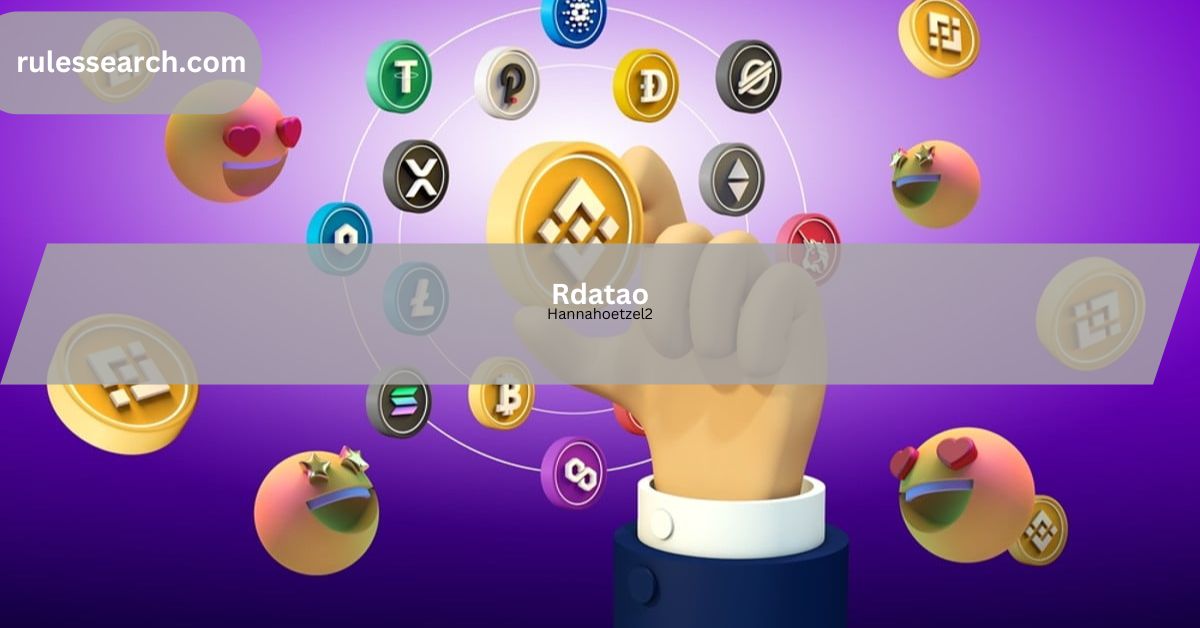In today’s world, data is a vital resource for businesses, researchers, and government agencies alike. Managing large volumes of data efficiently and securely is crucial, and Rdatao is an innovative system designed to meet these needs.
This article explores Rdatao’s features, benefits, and the reasons it stands out in the realm of data management.
What is Rdatao?
Understanding Rdatao:
Rdatao is a sophisticated data management system that helps organizations handle large amounts of data effectively. It is built on robust architecture, ensuring smooth data processing and storage, making it an essential tool for anyone dealing with substantial datasets.
Key Features of Rdatao:
- Robust Architecture: Rdatao’s design supports high data volumes without compromising on speed or efficiency.
- Advanced Data Handling: Equipped with smart algorithms, Rdatao processes and analyzes data swiftly, facilitating quicker decision-making.
- Top-Notch Security: Security is paramount in Rdatao, offering protection against unauthorized access and data breaches.
Why Rdatao is Important?
Data:
In the modern era, data is often compared to oil due to its immense value in driving economic growth. Just as oil needs refining, data requires proper management to unlock its full potential. Rdatao serves as a data refinery, transforming raw data into actionable insights.
Efficiency in Data Management:
Traditional data management systems can struggle with large datasets, leading to inefficiencies. Rdatao addresses these challenges with its streamlined processes, making it a reliable choice for organizations that rely heavily on data.
Security in Data Management:
As cyber threats increase, securing data becomes a top priority. Rdatao’s advanced security features ensure that sensitive information is protected from potential breaches.
How Rdatao Works?
Data Storage and Retrieval:
Rdatao organizes data in a structured manner, making it easy to store and retrieve specific information. This organized approach is crucial for businesses that need quick access to particular datasets.
Data Analysis and Reporting:
One of Rdatao’s standout features is its ability to analyze and report data efficiently. This capability is vital for businesses and researchers who need to interpret data quickly and accurately.
Integration with Other Systems:
Rdatao is designed to integrate seamlessly with other tools and systems, ensuring that data is always up-to-date and can be used in conjunction with other software platforms.
Benefits of Using Rdatao?
For Businesses:
- Enhanced Decision-Making: Quick data analysis leads to better business decisions, enhancing profitability and customer service.
- Cost Efficiency: By streamlining data management, Rdatao reduces operational costs.
- Scalability: As businesses grow, Rdatao scales with them, ensuring that data management capabilities expand alongside business needs.
For Researchers:
- Efficient Research Processes: Researchers can manage large datasets with ease, leading to faster and more accurate results.
- Improved Collaboration: Rdatao’s integration features facilitate collaboration among research teams by allowing secure data sharing.
- Data Security: Protecting sensitive research data is crucial, and Rdatao’s security features ensure this protection.
Rdatao vs. Traditional Data Management Systems?
Speed and Efficiency:
Traditional systems often slow down under the pressure of large datasets. Rdatao’s architecture is designed to handle these challenges, ensuring efficient data management.
Security Features:
While traditional systems may offer basic security, Rdatao provides advanced protection against modern cyber threats, making it a safer choice for sensitive data.
User-Friendly Interface:
Many traditional data management systems are complex and difficult to use. Rdatao, however, offers an intuitive interface that is easy to navigate, even for those without technical expertise.
Real-World Applications of Rdatao?
In Business:
Businesses across various industries, including retail, healthcare, and finance, use Rdatao to manage customer data, optimize operations, and drive decision-making based on real-time insights.
In Research:
Research institutions use Rdatao to manage and analyze large datasets, streamlining research processes and facilitating collaboration among teams.
In Government:
Government agencies utilize Rdatao for managing extensive public data, such as census information and public health records, ensuring this data is accessible and secure.
Getting Started with Rdatao?
Implementation Process:
The process of implementing Rdatao is straightforward:
- Assessment: Evaluate your data management needs.
- Setup: Install and configure Rdatao to work with your existing systems.
- Training: Educate your team on how to use Rdatao effectively.
- Go Live: Transition to using Rdatao for day-to-day data management.
Training and Support:
Rdatao provides extensive training and support resources, including online tutorials, webinars, and one-on-one training sessions, ensuring that users can maximize the system’s capabilities.
Future of Data Management with Rdatao?
Continuous Updates:
Rdatao is continually updated with new features and improvements, ensuring that it remains at the forefront of data management technology.
Growing Importance of Data Management:
As the value of data continues to rise, systems like Rdatao will become increasingly essential for organizations of all sizes. Investing in a system like Rdatao ensures that you are prepared for the future of data management.
FAQ’s:
1. How does Rdatao enhance data security for businesses and organizations?
Rdatao incorporates advanced encryption and security protocols that safeguard data against unauthorized access and cyber threats, ensuring that sensitive information remains protected.
2. How does Rdatao differ from traditional data management systems?
Unlike traditional systems, Rdatao offers advanced data handling capabilities, robust architecture, and top-notch security, making it more efficient and reliable.
3. Who can benefit from using Rdatao?
Rdatao is beneficial for businesses, researchers, and government agencies needing to manage large datasets effectively and securely.
4. Is Rdatao easy to use?
Yes, Rdatao is designed with a user-friendly interface, making it accessible to users with varying levels of technical expertise.
5. Can Rdatao be integrated with other systems?
Yes, Rdatao can integrate seamlessly with other data management tools and software platforms.
6. What types of data can Rdatao manage?
Rdatao can manage various data types, including customer information, research data, and financial records.
7. How secure is Rdatao?
Rdatao employs advanced security measures to protect data from unauthorized access and cyber threats.
8. How does Rdatao assist in decision-making?
By providing quick and accurate data analysis, Rdatao helps organizations make informed decisions based on real-time data.
9. What is the process for implementing Rdatao?
Implementing Rdatao involves assessing your data needs, setting up the system, training your team, and going live with the platform.
10. Does Rdatao receive regular updates?
Yes, Rdatao is regularly updated with new features and improvements to ensure it remains at the cutting edge of data management technology.
Conclusion:
Rdatao is revolutionizing how organizations manage their data. With its robust architecture, advanced data handling capabilities, and superior security features, it is a must-have tool for any entity dealing with large datasets. As we continue to move into a data-driven future, Rdatao’s role in helping businesses, researchers, and governments manage their data will only grow.



